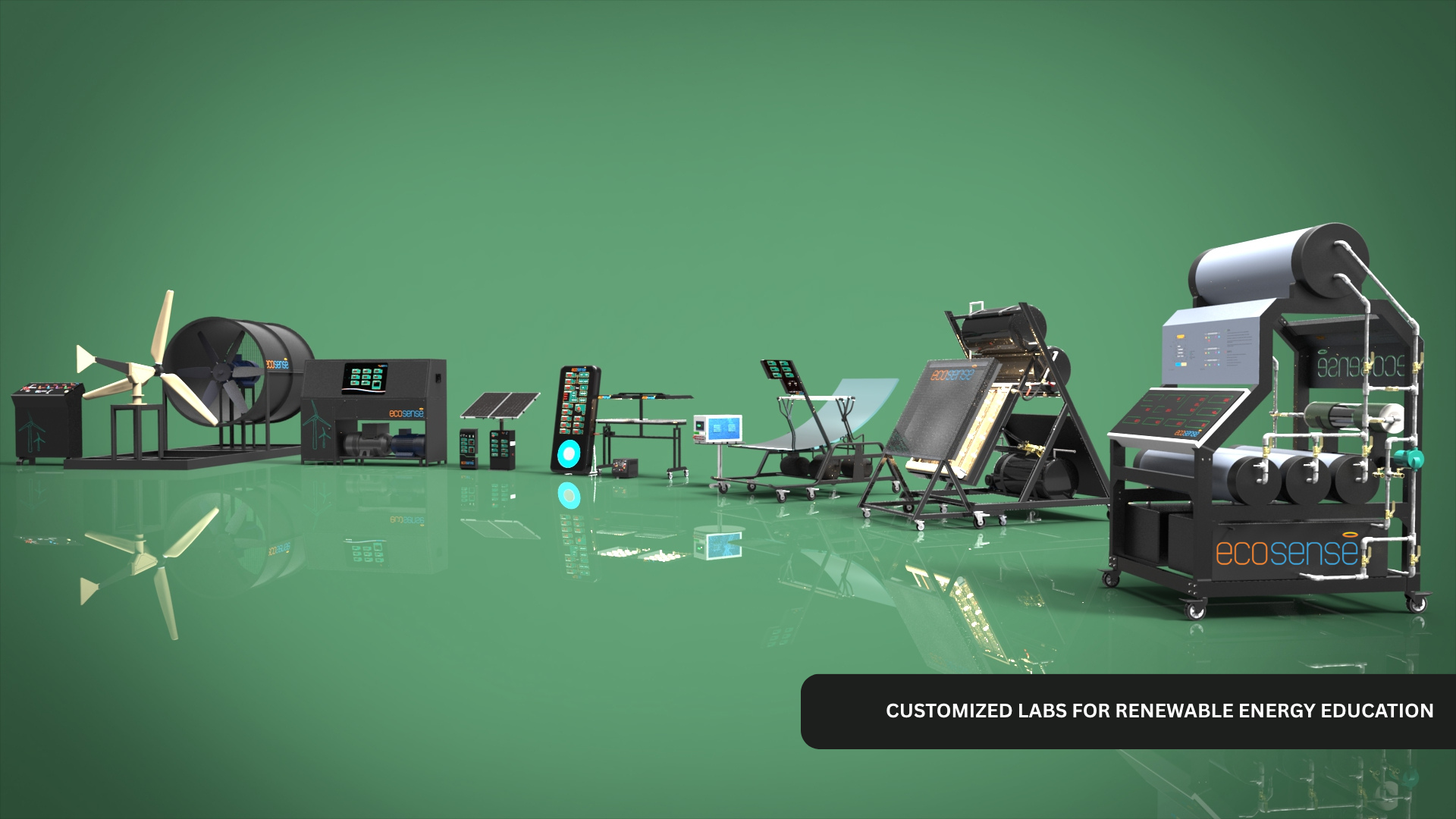Customized Labs for Renewable Energy Education: Why One Size Does Not Fit All
The world is undergoing a rapid shift toward clean, sustainable energy—and with it comes the growing demand for engineers, technicians, and innovators equipped with the right skills. From solar photovoltaics and wind energy to green hydrogen and microgrids, renewable technologies are evolving quickly. But here is a truth many institutions are now realizing: when it comes to renewable energy education, one-size-fits-all labs simply do not work.
At Ecosense, we have spent over a decade designing
and deploying renewable energy labs in universities, IITs, polytechnics, and
skill centers across India and abroad. And if there is one thing we have
learned, it is that every institution has a different teaching approach,
infrastructure, curriculum need, and research vision. This is why
customization is not optional—it is essential.
The Diversity of Renewable Energy Learning Goals
Renewable energy is not a single subject—it is a broad
ecosystem that includes:
- Solar
PV system design and monitoring
- Wind
energy conversion and turbine control
- Solar
thermal heat transfer and storage
- Battery
energy storage systems
- Microgrids
and energy management systems
- Green
hydrogen generation, storage, and fuel cell application
Each topic requires specific hardware configurations,
software tools, control systems, and safety mechanisms. Some institutions
focus on undergraduate training, where simplicity and visibility matter most.
Others focus on R&D, where precision instruments, high-fidelity data
logging, and experimental flexibility are priorities.
The educational goals vary widely, and so should the lab
infrastructure.
Curriculum Alignment and Flexibility
A major reason why institutions seek customized labs is to align
lab work with their university curriculum or regulatory frameworks. While
national councils like AICTE or UGC provide broad guidelines, every university
tweaks lab requirements to fit internal credits, course outcomes, and
evaluation formats.
For example:
- One
college may require a lab for basic solar panel characteristics and I-V
curves.
- Another
might need a setup to explore MPP tracking algorithms, inverter
efficiencies, and grid injection behavior.
- A
polytechnic might need visually intuitive trainer kits for skill
training.
- A
research university may demand open-ended platforms to test their
own controllers or simulate extreme conditions.
Standardized, off-the-shelf lab systems often fail to
deliver meaningful outcomes in such varied contexts. That’s where tailored
design plays a key role.
Infrastructure Constraints and Smart Lab Design
Another important reason to customize is infrastructure.
Not every campus has the same power availability, lab space,
or budget. Some labs may need to operate entirely on DC supply. Others may need
to be mobile or rooftop-based, especially in space-constrained urban
colleges. A few institutions want to demonstrate integration with existing
solar installations or simulate grid outage scenarios.
By understanding these ground realities, Ecosense works
closely with clients to design systems that fit:
- The
available space and utility requirements
- The faculty’s
comfort with software platforms
- The student
batch size and rotation planning
- The electrical
safety and storage constraints
This ensures the lab not only fits technically but also
works seamlessly in daily academic schedules.
Supporting Research and Innovation Through Custom Features
When it comes to postgraduate research or PhD-level
experimentation, customization isn’t just helpful—it’s a necessity.
Researchers often want the ability to:
- Plug
in their own algorithms for BMS, MPPT, or VCU control
- Run controlled
stress tests on batteries or electrolyzers
- Simulate
realistic grid faults, blackouts, or energy overflow
- Compare
different storage technologies or generation methods
- Integrate
the lab with MATLAB, LabVIEW, or Python environments
Such work is impossible with static systems. That’s why
Ecosense labs include features like open-source firmware, FPGA/PLC-based
control, and real-time data logging with cloud interfaces. This
opens the door for students and faculty to use the lab not just for
instruction—but for grants, publications, and industry problem-solving.
Case in Point: Tailored Labs in Action
We’ve implemented customized labs across a wide range of
academic and geographic contexts, such as:
- A Zonal
DC Microgrid at IIT Roorkee, designed to teach fault isolation and
energy zoning.
- A solar
thermal lab with thermal energy storage at IIT Delhi’s Abu Dhabi
campus, enabling research in high-temperature renewable systems.
- A Green
Hydrogen Lab at VJTI Mumbai with compact PEM electrolyzers and fuel
cells, built specifically for undergraduate visibility and postgraduate
experimentation.
- A wind-solar
hybrid lab at Universidad Metropolitana, Venezuela—adapted for
off-grid, international deployment.
Each of these labs was co-designed with faculty to
serve both immediate academic needs and long-term research ambitions.
Why Customization Delivers Better Learning Outcomes
When labs are tailored to fit an institution’s syllabus,
skill levels, and infrastructure, the results are measurable:
- Students
engage more actively, because the systems are designed to be
intuitive and hands-on.
- Faculty
spend less time troubleshooting compatibility issues and more time
teaching or publishing.
- Administrators
justify funding easily by aligning labs with specific program
outcomes or accreditation goals.
- Institutions
build stronger industry partnerships, as labs support real-world
experimentation.
In short, customization leads to labs that are utilized
more often, maintained more easily, and respected more deeply—both
inside and outside the institution.
Conclusion: The Future of Clean Tech Education is Customized
Renewable energy education is not just about installing
equipment. It’s about creating an environment where students can explore, fail
safely, and innovate confidently. This can only happen when labs are designed
for the learners they serve.
At Ecosense, we don’t believe in one-size-fits-all
solutions. We believe in listening, understanding, and building labs that adapt
to each institution’s unique journey—whether it’s skilling technicians in solar
panel installation or enabling PhD scholars to test microgrid control
strategies.
If your institution is planning to establish or upgrade its
renewable energy lab, let’s start with a conversation—not a catalog. Because
your goals deserve more than a standard solution—they deserve a custom-built
future.

